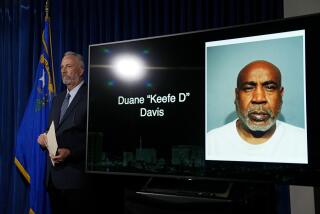A deception most deadly
- Share via
CHICAGO — More than 100 family members and friends attended Ari Squire’s memorial banquet and signed his online condolence book, mourning a man they said was kind, selfless and gentle.
But the charred remains of the man found under Squire’s truck, ostensibly killed when a jack slipped, weren’t Squire’s.
He was alive and well, police say, and his wife knew it.
The congenial man, “the most kind, spirited and giving person ever,” as one friend wrote, allegedly was involved in a bizarre tale of desperation, deception and murder -- all in an effort to collect a $5-million life insurance policy and start over with a new identity.
Authorities say that Squire killed a 20-year-old man, used the body to stage his own death, then committed suicide March 2 in a suburban St. Louis motel as police approached.
“We have one murderer who was too much of a coward to face the music,” Lake County Sheriff Mark Curran said at a press conference. “He put a bullet through his head.”
Now authorities want to know if Squire’s wife, Denise, played a role in the slaying of Justin Newman, the man found in the couple’s garage Feb. 23. Police believe Ari Squire, 39, lured Newman to his home with the promise of a construction job.
Police described Denise Squire, 46, a former adjunct professor in health studies at National-Louis University in Wheeling, Ill., as a “person of interest” in the case.
The Squires sent at least four e-mails to each other after Ari Squire had supposedly died, authorities said. In an e-mail Feb. 29, the day of his memorial dinner, Denise Squire allegedly told her husband that 120 people had attended his banquet at Maggiano’s Little Italy in Skokie, officials said.
Denise Squire’s attorney has proclaimed her innocence.
Police believe Ari Squire may have been trying to collect on a life insurance policy the couple took out five years ago.
Squire, a diesel-truck racing enthusiast who built a three-car garage addition on his home a few years ago, was under financial pressure. He pleaded guilty last fall to bilking Medicare through a home health-care business he previously operated.
U.S. District Judge Harry D. Leinenweber sentenced Squire last December to five years’ probation and placed him on six months’ home confinement. He was ordered to pay $63,000 in restitution.
A federal civil case built on the same allegations was settled last year; a judge ordered Squire to pay $126,000. The government accused Squire of falsely billing Medicare an estimated $2.3 million from 1998 to 2001.
In a memo to the judge in the criminal case, his attorney, Ronald Clark, said Squire was “financially ruined and personally devastated.”
The latest revelations left a grieving mother wondering if her son had been selected for murder based on having a similar build to Ari Squire, and friends and relatives who had already mourned Squire’s passing facing a fresh round of grief.
Jose Gomez, who worked as a laborer for Squire’s firm, Main Beam Construction Inc., and knew Squire for at least 20 years, said he didn’t believe that Squire was a killer. “He didn’t cheat people. He was a very honest guy,” Gomez said.
When police and firefighters rushed to Squire’s home early in the morning of Feb. 23 to put out the suspicious garage fire, they found the charred body of a man -- clad in Squire’s clothes down to his underwear, with his wallet, identification and credit cards -- beneath Squire’s souped-up Chevy Silverado pickup. A broken car jack was nearby.
As Denise Squire planned her husband’s memorial dinner, he allegedly assumed Newman’s identity and drove his victim’s car to St. Charles, Ill., where he stayed at a Best Western hotel for a few days before going to Missouri. Police said he obtained a prepaid credit card in Newman’s name, bought blue-tinted contact lenses and hair dye to make himself look more like Newman.
Newman’s mother reported him missing on Feb. 25. Donna FioRito told police that the only word she’d had from her son was a text message Feb. 24 saying he was going to Missouri and would return in a week. Authorities believe Squire sent the message from Newman’s cellphone.
The two men met at a Home Depot store where Newman worked and Squire visited regularly, according to Newman’s half-brother, Frank Testa.
He said Squire told Newman recently, “You look like a hard worker. What do they pay you? I can pay you better.”
Newman had worked hard to support his mother for six years and was excited at the opportunity to make more money so they could move out of their cramped apartment, Testa said. Feb. 23 was to be his first day at his new job.
“My mom made his lunch, kissed him goodbye, and that was the last time she saw him,” Testa said.
He said the family was devastated. “He was a good kid who got taken advantage of.”
Cook County sheriff’s police put Newman’s name in a national database of missing persons. A few days later, on Feb. 29, Squire checked into a Days Inn in Eureka, Mo., authorities said. It was just after midnight March 2 that a local police officer did a routine license plate check on Newman’s red Pontiac Sunfire.
After learning from the inn’s proprietor that a man named Justin Newman had recently checked in, officers knocked on his door.
“They heard some movement in the room, followed by a single gunshot,” Curran said. Inside, they found a man’s body, dead from an apparent self-inflicted gunshot wound to the head. Scattered around the room were pieces of Newman’s identification.
The Saint Louis County medical examiner determined later that day through fingerprint comparison that the body was Squire’s, but it would be a few more days before Lake County authorities conclusively identified the burned body.
Coroner Richard Keller said his office on Feb. 23 “tentatively” identified the body in the garage as Squire, based on identification found in the back pocket and clothing, but fire damage to the face, arms and hands had made identification difficult.
An autopsy found the man had died of massive trauma to the chest and a ruptured heart, and he likely died before the fire started, Keller said.
Even then red flags hinted that it was not Squire’s body.
Squire’s wife and his business partner told investigators that he had tattoos on his upper arms, Keller said. In examining the body “those tattoos were not present where they should have been.”
It took about 10 days for investigators to get Squire’s dental records. They didn’t match the teeth.
On March 4, authorities confirmed through DNA testing that the body was Newman’s.
Curran said Squire’s wife has been “less than fully candid.” Police have questioned her but she has not been charged.
Lake County State’s Atty. Michael Waller said his office is cooperating with the sheriff’s investigation.
Denise Squire previously worked as an administrator in the Scott Nolan Behavioral Health Center at Maryville Academy in Des Plaines, Ill., records show. The Nolan Center previously was owned and operated by Ari and his father, Morris Squire, until it was sold to Maryville in 1999.
The sheriff said e-mail exchanges between Squire and his wife indicate that she knew he was alive.
In the first message, the day after the fire, Squire wrote: “My will and letters are located in my file drawer in my office.”
Five days later, he sent another message. “Did an accident happen?” he asked, according to the e-mails read by Curran at the news conference.
“Yes,” Denise Squire responded, according to the transcripts.
“Per my will, when is the party set for?” Ari Squire asked.
“Working on that now,” she replied.
At the end of the e-mail, Ari Squire asked his wife if she needed anything.
“A new life,” she replied.
--
Tribune reporters Emily S. Achenbaum, Lisa Black and Tara Malone, and freelance reporter Ruth Fuller contributed to this report.
More to Read
Sign up for Essential California
The most important California stories and recommendations in your inbox every morning.
You may occasionally receive promotional content from the Los Angeles Times.










